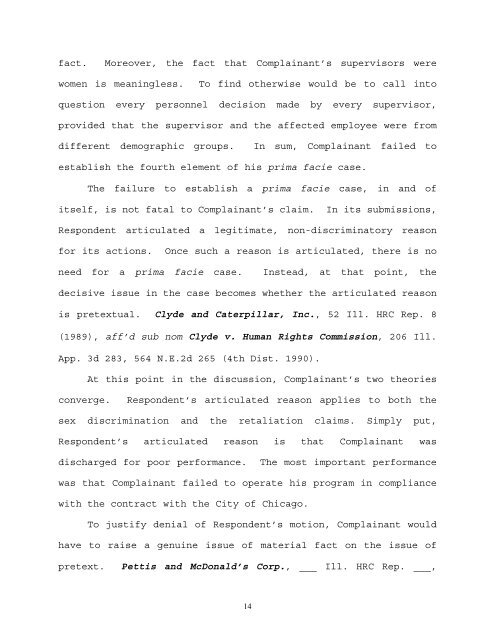Prentiss Sullivan v. Centers for New Horizons, Inc. - State of Illinois
Prentiss Sullivan v. Centers for New Horizons, Inc. - State of Illinois Prentiss Sullivan v. Centers for New Horizons, Inc. - State of Illinois
fact. Moreover, the fact that Complainant’s supervisors werewomen is meaningless. To find otherwise would be to call intoquestion every personnel decision made by every supervisor,provided that the supervisor and the affected employee were fromdifferent demographic groups. In sum, Complainant failed toestablish the fourth element of his prima facie case.The failure to establish a prima facie case, in and ofitself, is not fatal to Complainant’s claim.In its submissions,Respondent articulated a legitimate, non-discriminatory reasonfor its actions.Once such a reason is articulated, there is noneed for a prima facie case. Instead, at that point, thedecisive issue in the case becomes whether the articulated reasonis pretextual. Clyde and Caterpillar, Inc., 52 Ill. HRC Rep. 8(1989), aff’d sub nom Clyde v. Human Rights Commission, 206 Ill.App. 3d 283, 564 N.E.2d 265 (4th Dist. 1990).At this point in the discussion, Complainant’s two theoriesconverge. Respondent’s articulated reason applies to both thesex discrimination and the retaliation claims. Simply put,Respondent’s articulated reason is that Complainant wasdischarged for poor performance.The most important performancewas that Complainant failed to operate his program in compliancewith the contract with the City of Chicago.To justify denial of Respondent’s motion, Complainant wouldhave to raise a genuine issue of material fact on the issue ofpretext. Pettis and McDonald’s Corp., ___ Ill. HRC Rep. ___,14
(1991CF2143, October 10, 2001).He failed to meet that burden.As discussed earlier, Complainant conceded that his programwas not in compliance with the city’s contract. He did notcontest the city’s audit findings, not even the finding that hisprogram failed to operate during a year of the contract. Heoffered nothing to indicate any improvement in his performanceafter the audit findings were announced. Moreover, he offerednothing to indicate that Respondent did not really believe hisperformance was a severe problem.Accordingly, it is impossibleto find fault with Respondent’s assertion that his performancewas unacceptable when he was fired.In other words, there is no evidence whatsoever to suggestthat Respondent’s articulated reason is pretextual.Thus, thereis no genuine issue of material fact on the issue of pretext andRespondent’s motion for summary decision should be granted.RECOMMENDATIONBased upon the foregoing, there are no genuine issues ofmaterial fact regarding pretext and Respondent is entitled to arecommended order in its favor as a matter of law.Accordingly,it is recommended that the complaint in this matter be dismissedin its entirety, with prejudice.HUMAN RIGHTS COMMISSIONENTERED: July 2, 2002BY:____________________________MICHAEL J. EVANSADMINISTRATIVE LAW JUDGEADMINISTRATIVE LAW SECTION15
- Page 3 and 4: 7. For 1999, Respondent was require
- Page 8: The method of proving such allegati
- Page 11 and 12: other words, Complainant does not c
- Page 13: affidavit to indicate how he knows
fact. Moreover, the fact that Complainant’s supervisors werewomen is meaningless. To find otherwise would be to call intoquestion every personnel decision made by every supervisor,provided that the supervisor and the affected employee were fromdifferent demographic groups. In sum, Complainant failed toestablish the fourth element <strong>of</strong> his prima facie case.The failure to establish a prima facie case, in and <strong>of</strong>itself, is not fatal to Complainant’s claim.In its submissions,Respondent articulated a legitimate, non-discriminatory reason<strong>for</strong> its actions.Once such a reason is articulated, there is noneed <strong>for</strong> a prima facie case. Instead, at that point, thedecisive issue in the case becomes whether the articulated reasonis pretextual. Clyde and Caterpillar, <strong>Inc</strong>., 52 Ill. HRC Rep. 8(1989), aff’d sub nom Clyde v. Human Rights Commission, 206 Ill.App. 3d 283, 564 N.E.2d 265 (4th Dist. 1990).At this point in the discussion, Complainant’s two theoriesconverge. Respondent’s articulated reason applies to both thesex discrimination and the retaliation claims. Simply put,Respondent’s articulated reason is that Complainant wasdischarged <strong>for</strong> poor per<strong>for</strong>mance.The most important per<strong>for</strong>mancewas that Complainant failed to operate his program in compliancewith the contract with the City <strong>of</strong> Chicago.To justify denial <strong>of</strong> Respondent’s motion, Complainant wouldhave to raise a genuine issue <strong>of</strong> material fact on the issue <strong>of</strong>pretext. Pettis and McDonald’s Corp., ___ Ill. HRC Rep. ___,14



